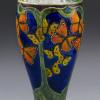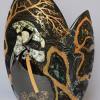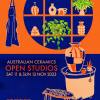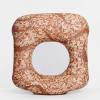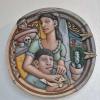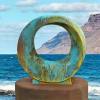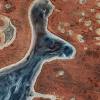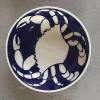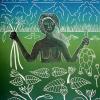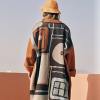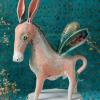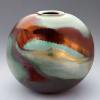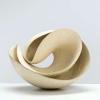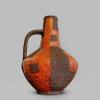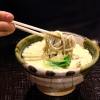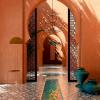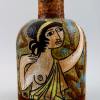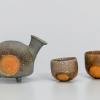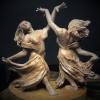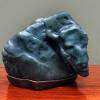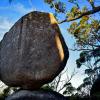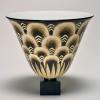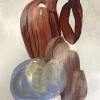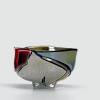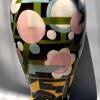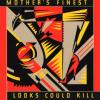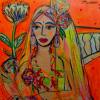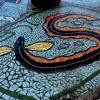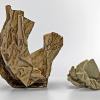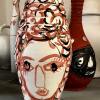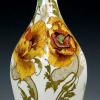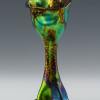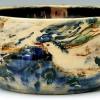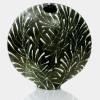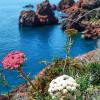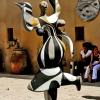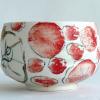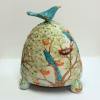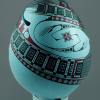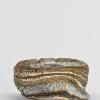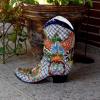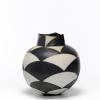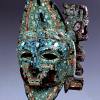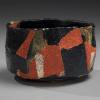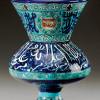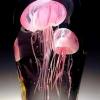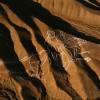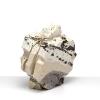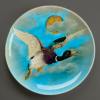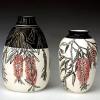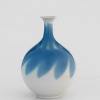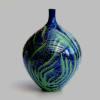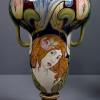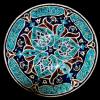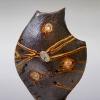Jean and Jacqueline Lerat, 1969
7 centuries of pottery crafts
La Borne has been an active pottery center since the 13th century. Known for centuries as a “Village de Potiers,” La Borne is nestled in the environs of lush forests, over 3000ft above sea level in the Berry province of Central France. Currently it is the epicenter for around 100 active potters and their workshops, drawn to the area for its rich tradition of woodfired stoneware and a pioneering creative spirit. A Contemporary Ceramics Center has also been established in La Borne since 2010 that provides workshops, exhibition space and the ability to liaise with local potters and tap into their rich clay art tradition. Close by are other pottery centres such as Nevers and Gien and it’s also nearby beautiful middle-age city of Bourges
In the 15th century, the La Borne potters mastered the technique of firing the excellent local clays to a temperature of 1280C to create waterproof qualities for their pots. The local fine anthracite clays react wonderfully to long firings with wood, possibly due to it containing iron pyrites. This led to the production of quality utilitarian wares and other hand-thrown and sculpted forms. A pottery-making tradition in La Borne flourished over the centuries, with technical skills and knowledge being passed down to new generations of potters.
Expo au Centre Céramique Contemporaine de La Borne
Photo – Patrice Régnier
The early part of the 20th century saw a decline in demand for the La Borne wares with the popularity of new materials like aluminum and glass, with streamlined designs, used for the creation of utilitarian wares. Numerous workshops closed down, and the huge wood-burning kilns fell into disuse. While in 1914, 14 furnaces were in operation, by 1950 there remained only four. Simultaneously, a renaissance was occurring through the wave of new designers, ceramicists and sculptors that came to settle in La Borne during the German Occupation n the 1940‘s. These innovative artists succeeded in uniting modern art with the traditional stoneware, by highlighting its strength, earthy colors and textures with revolutionary shapes and glazes. This inspired a liberating approach to the ceramic arts that has continued to develop throughout the 50‘s and 60‘s and beyond.
This started in 1941 with the arrival of artists Jean and Jacqueline Lerat, who came to study traditional ceramic techniques and eventually adapted this into a freer artistic expression. Other French and international artists such as Paul Beyer, André Rozay and Vassil Ivanoff arrived in 1946 followed by Pierre Mestre, Elisabeth Joulia, Yves et Monique Mohy, Anne Kjaersgaard, Jean Linard and Claudine Monchaussé coming to join this Post War ceramic movement. They made a significant contribution to elevating the language of ceramics design into a serious art form.
In 1987 the Musée de la Poterie, was founded to protect the local heritage, and has managed to assemble a remarkable collection of ancient items such as salting jars, oil containers, pitchers, finials and vases that were made locally.
La Borne still continues to be a thriving pottery precinct and a collection of pieces from the local artists are on display below.
La Borne’s wooded laneways are scattered with lots of pottery workshops.
Sancerre vineyards are nearby to La Borne

Yves Monty, 1974
Elisabeth Joulia
1990
Photographie de Thibault Breton
Ceramic berry bowl – Alicia Rochina
Alicia Rochina
Anne Reverdy
Bernard David
‘At the edge of landscape II’ –7 series, Brigitte Marionneau
2014 height-36cm
‘Mask, 3-III Series’ – Brigitte Marionneau
2010 h.32cm
photo – Pascal Vangysel
Charlotte Poulsen
Charlotte Poulsen
Christine Limosino Favretto
Claude Gaget
Claude Voisin, Bourges
After more than 3 years of experimental theater, jazz dance, African dance, and after more than 30 years of architecture, Claude Voisin egan creating ceramic sculptures in 2000.
Claude Voisin
Claude Voisin
Claudie Guillaume Charnaux, Morogues
Corinne Decoux, Saint Satur
Corinne Decoux, Saint Satur
La Borne kiln
Dalloun, La Borne
Dalloun likes to explore a forgotten technique which is very very old (2500 years): sigillata earth – the many opportunities for cooking and the infinite variety of wild clays, provides a wealth of colors and tones, thanks to the iron oxide present in the earth.
Dalloun, La Borne
Dalloun, La Borne
David Louveau
Photos Pascal Vangysel
David Louveau – punchong vessel
David Louveau
David Whitehead
Eric Astoul
Technique: Wood Baking anagama, 1300c, 5-6 days
Photo – Pascal Vangysel
Eric Astoul
Photo – Pascal Vangysel
Eric Astoul
Eric Astoul
www.astouleric.fr
Francine Michel
Raky vessel – Françoise Blain, Crézancy en Sancerre
François Maréchal
Georges Sybesma
Georges Sybesma
Georges Sybesma
Lucien Petit
Lulu Rozay pitchet
Maya Micenmacher Rousseau, Ivoy le Pré
Nicolas Rousseau, Ivoy le Pré
Nicolas Rousseau
Pep Gomez, Les Girardins
Seugho Yang, Montigny
Ceramic teapot – Seugho Yang, Montigny
Svein Hjorth Jensen
Svein Hjorth Jensen
Sylvie Rigal, Sens Beaujeu
Sylvie Rigal, Sens Beaujeu
Viola Hering
Hervé Rousseau
Hervé Rousseau
Isabelle Coeur

‘Man With Tie’ – Jean Guillaume
photo – Claude Friess
Isabelle Pammachius
Photo – Pascal Vangysel
Isabelle Pammachius
‘Petite Chapelle’ – Jacques Laroussinie
Karina Schneider, La Gibonnière
Karina Schneider, La Gibonnière

Dragon – Jean Luc Belleville
Photo – Pascal Vangysel
Labbrigitte
Labbrigitte
Labbrigitte
Suzanne Daigeler footed ceramic vessel
‘Cathederal de Linard’ with mosaic facade – La Borne
More information on all the above artists can be seen here
La Borne Ceramique Contemporaine website
Next post – The Art of convo






































































